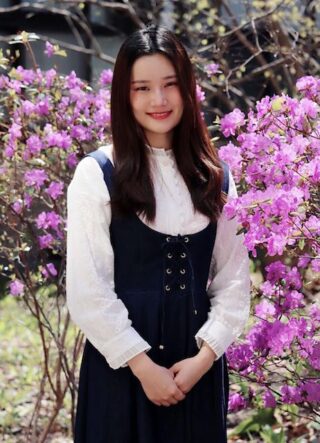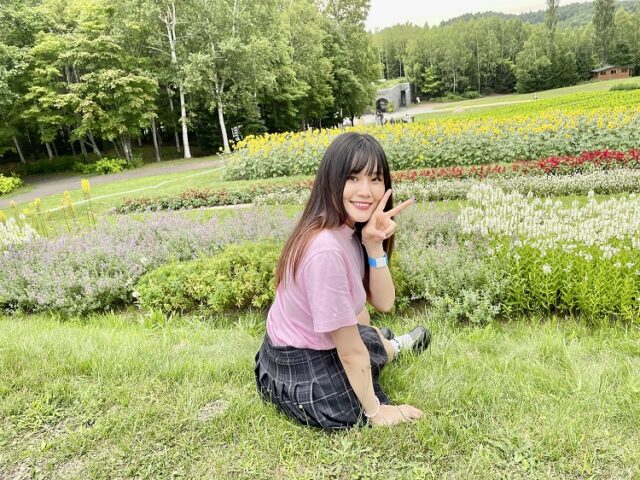 I was full of anxiety when I couldn’t come to Japan due to the spread of coronavirus infection, but I overcame it by receiving advice and encouragement while interacting with teachers and seniors in the laboratory through online classes and SNS. I am studying “quantifiers in Japanese” that I have been interested in since I was studying Japanese in China. Under the guidance of Professor Shigehiro Kato, I was able to notice new points of focus for research, and I am studying broadening my research horizons.
I was full of anxiety when I couldn’t come to Japan due to the spread of coronavirus infection, but I overcame it by receiving advice and encouragement while interacting with teachers and seniors in the laboratory through online classes and SNS. I am studying “quantifiers in Japanese” that I have been interested in since I was studying Japanese in China. Under the guidance of Professor Shigehiro Kato, I was able to notice new points of focus for research, and I am studying broadening my research horizons.
When did you come to Japan?
I learned Japanese at the Department of Japanese of Shanghai International Studies University in China. After graduating, I was hired at the Chinese branch of a Japanese corporation, where I taught Japanese to other employees while working in information infrastructure maintenance and planning in the IT division. There, I continued to develop a growing desire to improve my Japanese language ability even further and to study Japanese more deeply, and resolved to study in Japan. I was admitted as a research student starting in April 2020, but was not able to actually come to Japan at first due to the COVID pandemic. I finally arrived at the end of November. After arriving in Japan, I studied at the Hokkaido University Library from morning to evening every day together with friends from the foreign student dormitory, and took the second semester entrance exam in February 2021 for the Graduate School of Humanities and Human Sciences at Hokkaido University. I was accepted into the master’s program in April 2021, and engaged in research at the Laboratory of Linguistics under the guidance of Professor Shigehiro Kato.
What is your current research theme?
I am doing research on the theme “quantifier floating in the Japanese language”.
Ever since I started learning the Japanese language at a Chinese university, I have been interested in Japanese quantifiers. In Japanese, you can say, “Three apples, please(3つのリンゴをください),” but you can also say, “Apples, three, please(リンゴを3つください).” This kind of quantifier floating, in an expression in which the quantifier “three” comes after the noun “apple,” is not something you see in Chinese, and it is a word order that is rare among other foreign languages as well. So, I am conducting research out of a desire to elucidate this phenomenon in a linguistic science manner.
Why did you choose the Graduate School of Humanities and Human Sciences at Hokkaido University for your foreign study school?
When I searched about Japanese quantifiers on the internet, I kept running into technical linguistics words. The more I searched, the more I felt the limits of my knowledge, but also a rising curiosity towards new knowledge. In my search, I came across an academic paper by Professor Shigehiro Kato titled “Analysis of Quantifier Construction in Japanese.” Looking at Professor Kato’s profile, and learning about the breadth of his research domain, I came to feel that I wanted his guidance. Moreover, when I learned that Hokkaido University has a long history and tradition, and provides an environment that is welcoming to foreign students to learn in amidst rich educational resources, my desire to study at Hokkaido University grew even stronger.
Convincing my family of my choice to come study abroad in Japan was difficult. But I believed in the importance of studying in the country of the language I was interested in and improving my skills, so I gathered my courage and took the first step forward.
What are some reasons you are glad you chose to study at the Graduate School of Humanities and Human Sciences?
Concerning the field of linguistics, I have been made aware of new research focuses through classes and seminars. In researching quantifiers, it is necessary to broaden the range of your studies concerning related fields, like parts of speech and pragmatics. Right now, I am in the process of learning through an expanding research perspective. I need to harness this process to search for points that will serve as the framework of my master’s thesis, and then compile and edit them.
In addition to linguistics, I also want to learn broadly about Japanese culture and history as well, and in the first semester I took classes on things like Ainu culture. Through a variety of classes, I have been able to learn about a Japan previously unknown to me. Not only will this expand my own perspective, I believe it will also be a plus for my Japanese language research.
How is living in Sapporo and Japan?
 I have always loved Japan, and have even been coming here twice every year since I was 18. And Hokkaido is a place I have particular affection for. Since I arrived in Japan last year, I have been trying to visit the locations I learn about in class. Places like the Historical Village of Hokkaido, the Hokkaido Museum, Cape Kamui, and Lake Toya. And I also love Hokkaido seafood and hot springs.
I have always loved Japan, and have even been coming here twice every year since I was 18. And Hokkaido is a place I have particular affection for. Since I arrived in Japan last year, I have been trying to visit the locations I learn about in class. Places like the Historical Village of Hokkaido, the Hokkaido Museum, Cape Kamui, and Lake Toya. And I also love Hokkaido seafood and hot springs.
Jiangxi Province, where I am from, is warm compared to Sapporo, so the winter snow was a new experience for me. More than the cold, I am enchanted by the romantic snowy scenery. And while of course the Hokkaido University campus is amazing in the winter, it is also beautiful and pleasant in the spring with all the greenery sprouting and flowers blooming at once, and in the summer with its overflowing bounty of green. I am also looking forward to the autumn scenery bedecked with the Ginkgo Avenue trees.
Have you had any problems?
The period of time when I could not come to Japan because of the COVID virus even though I had already been accepted as a research student was very difficult. I had made up my mind to study in Japan, quitting my job and leaving myself no path to back off from the plan, but wound up with a fog covering my future, not knowing if I would actually be able to study in Japan after all. I was filled with anxiety. But luckily online classes launched in June, I became able to receive guidance from teachers while still in China, and while interacting with more experienced students in the department, my anxiety gradually dissipated. More experienced students recommended books that would help my studies and told me about the personality of our teachers. Also, I was able to interact with Chinese foreign students in other departments of the Graduate School of Humanities and Human Sciences via WeChat (SNS), and I continue exchanging information with them.
What kind of support are you glad to have received?
The supporter system assists foreign students living in Japan for the first time with things like opening a bank account and document procedures at government offices, so I was very grateful. The tutor system provides education and research support for foreign students, so I got a lot of advice when writing my research plan before the graduate school entrance exam.
When I was a research student, I lived in the foreign student dormitory. The dormitory manager was very kind and nice, and was a source of emotional support. The manager rooted for me and my dormitory friends as we spent every day studying for the entrance examination at the Hokkaido University library. And right before the entrance examination, the manager gave me a test passing talisman from the Hokkaido Shrine. Wanting to be worthy of that sentiment inspired me all the more to study so hard for the test.
When I was accepted into the graduate school, I moved from the foreign student dormitory into a private apartment. I used the Hokkaido University Coop services when looking for a room. I had heard that when a foreign student wants to rent an apartment, looking for a room and completing all of the procedures can be very difficult. But everything went smoothly, including applying for insurance, and I was very grateful.
- Looking for the room for International students (UNIV. CO-OP)
And although it is support for Chinese foreign students only, there is a social organization for Chinese foreign students called the “Chinese Students and Scholars Association in Hokkaido University.” It allows you to gain all sorts of information and interact with others. I have given lectures here on Japanese, and on how to use polite Japanese speech in particular.
Can you give a few words to people from foreign locations who want to study in the Graduate School of Humanities and Human Sciences at Hokkaido University?
Hokkaido University is a beautiful campus where you can enjoy many different kinds of scenery throughout the year. It provides a research environment where you can study calmly, in silence. The teachers are extremely knowledgeable and kind, leaving you completely assured that they will guide you through the research themes that appeal to you personally. And Hokkaido University Coop food is inexpensive and delicious. I especially recommend their curry and rice! Studying at Hokkaido University, where both the facilities and the people are accepting and inclusive, will be a life asset for you.
(interviewed in August, 2021)


